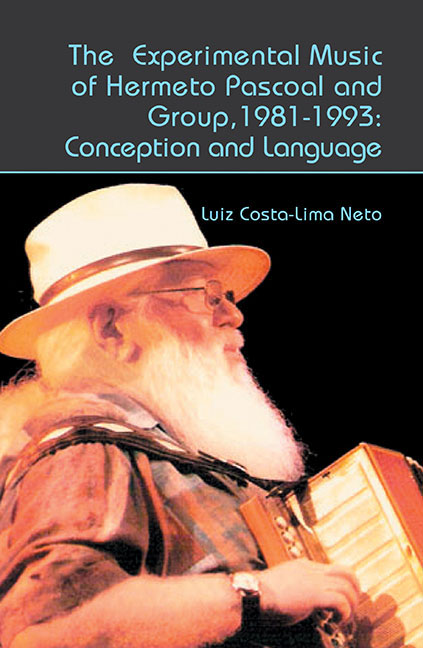Book contents
- Frontmatter
- Contents
- Miscellaneous Frontmatter
- Acknowledgments
- Introduction
- List of Illustrations
- Chapter 1 The conception and language of Hermeto Pascoal: first considerations
- Chapter 2 Bibliographic Discussion
- Chapter 3 The Creative Process Of Hermeto And Group
- Chapter 4 Reflections on Acoustics and Psycho-Acoustics
- Chapter 5 Selected Compositions For Analysis
- Conclusion
- Postscript
- Sources
- Plate section
Chapter 4 - Reflections on Acoustics and Psycho-Acoustics
- Frontmatter
- Contents
- Miscellaneous Frontmatter
- Acknowledgments
- Introduction
- List of Illustrations
- Chapter 1 The conception and language of Hermeto Pascoal: first considerations
- Chapter 2 Bibliographic Discussion
- Chapter 3 The Creative Process Of Hermeto And Group
- Chapter 4 Reflections on Acoustics and Psycho-Acoustics
- Chapter 5 Selected Compositions For Analysis
- Conclusion
- Postscript
- Sources
- Plate section
Summary
A constant noise
In the previous chapter we saw how Hermeto's trajectory – from Canoa da Lagoa by way of radio stations in the Northeast of Brasil, Regional groups, nightclubs in Rio de Janeiro and São Paulo, to the Quarteto Novo and records abroad – allowed him to have diverse professional experiences, incorporating several styles and musical elements into his language: northeastern music, both folkloric and popular (1936-1949); serenades, choro, and jazz (1950-1960); bossanova, samba, swing, and gipsy music (1961-1969). We also saw that Hermeto began to achieve international acceptance and renown as an instrumentalist, arranger and composer beginning with his stay in the U.S.A. in 1970-71.
Hermeto's language always presented differences in the manner in which he combined musical codes and in the way he innovated them. Starting with the LP Quarteto Novo (1967), then on to Seeds in the Ground (1970), to his first solo album, Brazilian Adventure (1971), Hermeto always stood out as an artist who already had his own personal way of playing and conceiving music.
If Hermeto's language, such as it appeared since his first solo album in 1971, was not limited to the styles with which he had been in contact with up to then, nor to others, such as U.S. jazz, where then should we search for the sources of the conception of his constantly transgressive language?
Perceiving difference or noise as a rupture that occurred on the musical as well as on the socioeconomic level, Hermeto's role as a hired performer in radio stations and nightclubs contained certain professional limits that he broke on becoming an arranger and composer, as well as an instrumentalist. This being true, the difference in Hermeto's musical language corresponded to the relationship he established with society.
Hermeto's rebelliousness was justified by the sociocultural traditions of his own life, which were subjected to his experimentation. The popular Northeastern tradition of music as an artisanal and autonomous activity based on family units seems to explain, in part, Hermeto's distrust of technology (“I'm not going to advertise the factory that produced the sampler”, he says) and, most of all, his constant rebelliousness towards the owners of the radio stations, nightclubs and recording companies.
- Type
- Chapter
- Information
- The Experimental Music of Hermeto Pascoal and Group, 1981–1993Conception and Language, pp. 61 - 78Publisher: Boydell & BrewerPrint publication year: 2015



